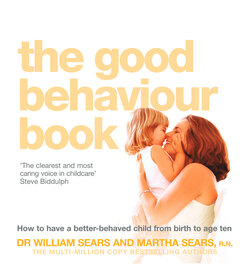Читать книгу The Good Behaviour Book - Марта Сирс - Страница 11
discipline’s top ten – an overview of this book
ОглавлениеOne day I was watching a family in my waiting room. The toddler played happily a few feet away from the mother, sometimes returning to her lap for a brief reconnecting cuddle, and then darting off again. As he ventured farther away, he glanced back at her for approval. Her nod and smile said “It’s OK”, and he confidently explored new toys. The few times the child started to be disruptive, the mother connected eye-to-eye with him and the father physically redirected him so that he received a clear message that a change in behaviour was needed. There was a peace about the child and a comfortable authority in the parents. It was easy to see that they had a good relationship. I couldn’t resist complimenting them: “You are good disciplinarians.” Surprised, the father replied, “But we don’t smack our child.”
Our understanding of the word “discipline” was obviously different, like many other parents, they equated discipline with reacting to bad behaviour. They didn’t realize that mostly discipline is what you do to encourage good behaviour. It’s better to keep a child from falling down in the first place than to patch up bumps and scrapes after he has taken the tumble.
Discipline is everything you put into children that influences how they turn out. But how do you want your child to turn out? What will your child need from you in order to become the person you want him to be? Whatever your ultimate objectives, they must be rooted in helping your child develop inner controls that last a lifetime. You want the guidance system that keeps the child in check at age four to keep his behaviour on track at age forty, and you want this system to be integrated into the child’s whole personality, a part of him or her. If your child’s life were on videotape and you could fast-forward a few decades, what are the qualities you would like to see in the adult on the tape? Here is our wish list for our children:
• sensitivity
• confidence and solid self-esteem
• wisdom to make right choices
• ability to form intimate relationships
• respect for authority
• skills to solve problems
• sense of humour
• ability to focus on goals
• honesty, integrity
• healthy sexuality
• sense of responsibility
• desire to learn
Once you know your objectives, you can set about figuring out how to achieve them. Remember, your child is not a blank slate on which you write your wishes. Your child’s personality is guided, not formed, by you and other significant persons. You must take the child’s individuality into account. Because children and parents have different temperaments and personalities, and families have different lifestyles, how parents guide their children will vary. Nevertheless, there are basic concepts that underlie all discipline, no matter what the characteristics of parent and child. The ten basic principles that follow should help you get started in thinking about how discipline will operate in your home. We’ll discuss each of these principles fully throughout the rest of the book.
